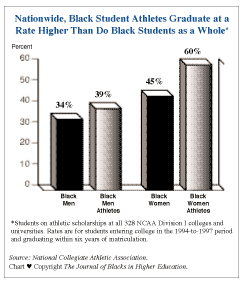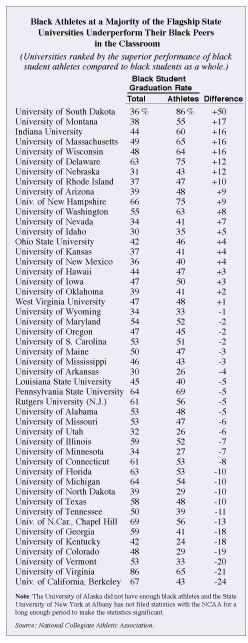| Are the Flagship State Universities Exploiting Black Athletes? Nationwide, blacks on athletic scholarships tend to graduate from college at a higher rate than black students generally. So why is the reverse true at the vast majority of state flagship universities?
Despite the public's perception of black college athletes as "dumb jocks" who are in college only to compete on the athletic field, the evidence at hand says that black scholarship athletes actually perform better academically than do black students as a whole. The latest statistics from the National Collegiate Athletic Association show that 34 percent of all entering black male college students go on to graduate. But a higher 39 percent of black males who enter college with an athletic scholarship go on to earn a diploma.
For black women, the differences are even greater. Overall, 45 percent of black women who enter college graduate within six years from the same institution. But for black women with an athletic scholarship, the graduation rate increases to 60 percent. This is nearly equal to overall graduation rates for white students. Probably the explanation for this result is that the financial aid provided by an athletic scholarship is a critical factor in enabling many black student athletes to stay in school. Black students who are not on athletic scholarship are far more likely to drop out of college for financial reasons. Black athletes at some schools also benefit from a light academic load and the fact that they are likely to "be cut some slack" by professors who want athletes to remain eligible to play their sports for the glory and prestige of their institutions. While black athletes nationwide tend to graduate at higher rates than black students generally, at the 50 flagship state universities, an entirely different picture emerges. In fact, only 20 of the nation's 50 flagship state universities post a higher black student graduation rate for athletes than they do for black students generally. At some flagship state universities black athletes, with all their financial advantages, graduate at rates far below those of college-enrolled blacks generally. The largest discrepancy occurs at the University of California at Berkeley. There, the overall black student graduation rate is 67 percent, one of the lowest rates of the nation's highest-ranked institutions. But only 43 percent of all blacks on athletic scholarship at Berkeley go on to graduate. At the University of Virginia, the overall black graduation rate stands at a very high 86 percent, among the highest rates in the nation. But only 65 percent of black athletes at the University of Virginia graduate.
Admissions officials at these two high-rated universities are extremely selective in choosing blacks who they feel will succeed academically. But it appears that the admissions officials at these schools are considerably less selective about the black athletes whom they admit. Over the past decade, hundreds if not thousands of black students have been denied admission to Berkeley because of the institution's state-imposed race-neutral admissions policy. Black student grades and SAT scores, on average, did not hold up to those of white and Asian applicants. But the admissions office appears to offer a major advantage to black athletic talent without regard as to whether or not they can handle the rigors of the Berkeley curriculum. So, too, at the University of Virginia, admissions criteria for black students appear to have tightened in recent years. But blacks with athletic prowess are eagerly passed through the admissions office. Flagship Universities Where Black Athletes Academically Outperform Their Black Peers The rule that black athletes will perform better than blacks generally because they have fewer financial burdens holds true at some flagship universities. In fact, at some schools the differences are huge. For example, at the University of South Dakota only 36 percent of all entering black students go on to graduate. But 86 percent of all blacks on athletic scholarships earned their diplomas. The small number of black students at the university makes the statistics of little value on a national scale. But at much larger schools with huge numbers of black students and black athletes, the athletic scholarship appears to offer a big boost in helping blacks finish college. At Indiana University, the University of Massachusetts, the University of Delaware, the University of Wisconsin, and the University of Nebraska, the large group of black athletes at these schools graduates at a rate that is at least 10 percentage points higher than all black students at these universities. Note that in some cases it is likely that the pressures of college sports force some black and some white athletes to neglect their studies at these large flagship universities. At these schools, athletes are flown around the country on private jets, they hold press conferences, and they sit for television interviews. These constraints on their time may, in some cases, lead to a lower black student graduation rate. But even athletes at lower-ranked state universities have hectic practice schedules and long and frequent road trips for games at other colleges and universities. They are often dogged by local press and television reporters and face similar pressures as athletes at flagship institutions to devote considerable time to their sport. But nationwide, black athletes as a whole are more likely than black students generally to graduate. It appears that many of these flagship state universities are admitting black students who are not academically qualified for even the moderately rigorous curricula at these schools. In many cases, these black athletes are admitted solely for the purpose of their participation in intercollegiate athletics. The case is strong that these flagship universities are exploiting blacks for their athletic talents while frequently ignoring their educational needs. | |





